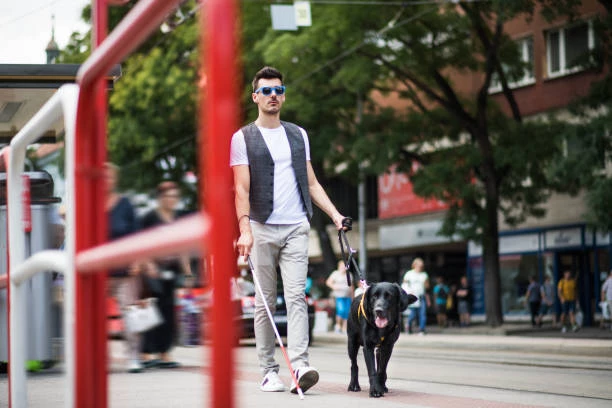SSDI Claims for Vision Impairment and Blindness
Qualifying for Disability Benefits in Philadelphia, PA
More than 24 million Americans, aged 18 and older, experience some degree of vision loss. Individuals are considered to be legally blind, meaning their vision is 20/200 or worse, may qualify for disability benefits. “Statutory” or “legal” blindness is considered a qualified disability by the Social Security Administration (SSA).
Persons who have experienced severe vision loss due to a variety of conditions, including retinopathy, glaucoma, or traumatic injury, as well as individuals who have been blind since birth, may qualify for disability benefits.
Unlike claimants with non-vision related disabilities, individuals who file a claim due to visual impairment, can qualify for disability benefits while continuing to work – provided they meet all SSA requirements.

How the SSA Awards Vision Benefits
Financial limits differ for those receiving disability benefits for vision loss compared to individuals receiving benefits for other reasons. Legally blind claimants are allowed to earn more, while still being allowed to retain their disability benefits.
The SSA utilizes a set earnings amount, which is usually adjusted on a yearly basis according to inflation and the cost of living. This amount is referred to as substantial gainful activity (SGA). For 2022, the SGA limit for those who are disabled, but not blind, is $1,350 per month, while the SGA for a blind, disabled individual is $2,260 per month.
If the person receiving disability benefits is self-employed, the evaluation process is different. Disability claimants who are not blind are not allowed to work more than 45 hours per month, while a blind individual is allowed to put in more hours, just as long as his or her net profit does not exceed the SGA amount.

Eye Problems That Qualify for Disability Benefits
Many eye problems qualify for Social Security disability benefits, and each of them is found in the SSA Blue Book. This is the SSA list of conditions that are considered as qualifying disabilities. Some eye issues that qualify include glaucoma, partial sight, legal blindness, ocular melanoma, macular degeneration, and Sjögren’s Syndrome.
Each condition requires the claimant to meet specific criteria set by the SSA for that particular condition. For instance, to meet the criteria for legal blindness, your vision cannot be corrected to better than 20/200 in your better eye, or your visual field is 20 degrees or less in the better eye. The condition must have lasted, or is expected to last, at least 12 months.
Once it is demonstrated that the claimant meets the work requirements for Social Security DIsability Insurance (SSDI), as well as the medical criteria outlined by the SSA for the respective Blue Book listing, your eye problem will be considered a disability by the SSA and you will be begin to earn SSDI benefits.
The Subtle Costs of Vision Loss as a Disability
Individuals born blind, or with a serious vision impairment, usually learn to thrive in the world despite their disability. However, because the world is dominated by sighted people, they often experience ongoing “adaptive living” costs as working adults. These costs include home modifications, transportation fees, and specialized technologies that allow the blind to live independently and perform essential tasks.
Even acquiring a guide dog may be cost prohibitive for a disabled worker. The cost of training and raising one service animal is approximately $50,000 according to the Guide Dog Foundation. There are several organizations that provide service dogs free of charge to the blind, however, their resources are limited. This means that blind individuals may wait months or even years for a guide animal unless they are able to pay for the training on their own.

In addition to the adaptive expenses blind people encounter, they often incur exorbitant medical bills as well – especially when the individual loses their sight later in life. Bills can add up quickly as doctors and patients alike do all they can to improve / retain sight using medications, surgical procedures, and other treatments.
This situation becomes particularly problematic for patients who have lost their health insurance due to job loss – which is unfortunately quite common when a worker is unable to continue performing their duties in their traditional field. For instance, a production worker who loses his or her sight cannot safely return to the same position after returning from medical leave.
Losing one’s sight is a difficult and stressful life transition, and worrying about making ends meet only adds to that stress. Disability benefits provide financial support and help to access occupational rehabilitation / training for new employment. Furthermore, these benefits can become an ongoing source of financial support as the individual begins a new type of employment.
Vision Impairment DIsability If You Are Older Than 55 or Blind in One Eye
The determination rules used by the SSA, if you are older than 55, are not the same as they are for anyone who is disabled, but not blind. If a claimant is older than 55, and become disabled due to vision impairment, their benefits will not be suspended if their earnings are in excess of the SGA limitation as long as the work they do requires a lower level of skill and ability than their previous position.
If you are blind in one eye, you may qualify for disability benefits if your impairment keeps you from working full time – or if you have another disability or severe ailment that makes it so you are unable to work. You will need to meet the medical criteria outlined by the SSA and you will have had to work long enough, at a job where you paid Social Security taxes, and earned enough work credits, to qualify.

Consult an Experienced Social Security Disability Attorney in Philadelphia
Dealing with severe vision loss or blindness is difficult, and even if you become fully accustomed to living with this condition, financial difficulties can persist due to limited employment opportunities. At the law offices of Leventhal, Sutton & Gornstein, our team of experienced SSD lawyers is here to help ensure you receive all the benefits you are entitled to.
Because of the complicated nature of Social Security disability law, it is always a good idea to book a case evaluation with one of our knowledgeable SSD lawyers in Scranton, Trevose, or any of the surrounding communities in northeastern Pennsylvania. Even if you’ve had your initial claim denied, we may be able to help you file a successful appeal. Reach out to our team of social security disability lawyers, and book your free consultation today

